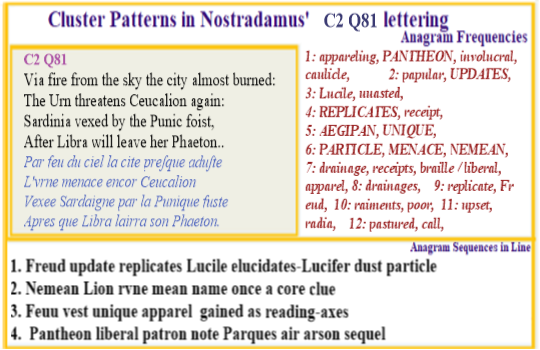 Analyses of all verses
Analyses of all verses
|
 Web Site
Web Site |
 All
Sefirots All
Sefirots |
Nostradamus C2 Q81: Fire from the sky affects plants and people in very different ways.
Copyright: Allan Webber, December 2015
 The first two lines of the text of this verse identify it clearly as one
of the set referring to a
fire falling
from the sky event and the subsequent
vast flood that
covers the earth at the end of this century.
The first two lines of the text of this verse identify it clearly as one
of the set referring to a
fire falling
from the sky event and the subsequent
vast flood that
covers the earth at the end of this century.
At the end of the last line there is an anagram for pantheon (n_Phaeton) meaning a set of gods related to a mythology, religion or tradition.
It also has an anagram for Parques (Apres_que) which is the French name for the Roman goddesses of fate controlling the metaphorical thread of life of every mortal and immortal from birth to death.
Along the lines suggested by these words the third line has an anagram for Aegipan (aigne_pa) who represents a Sea-Goat while in the second line there are anagrams for Nemean (ne_mena) Lion (lion). Together these images tell us to look at the constellations of Hercules and Capricorn for the source of the objects that produce the initial destruction. It may also allude to the pivotal impact this destruction has on birth.
The anagrams yield a wider spread of details which involve the legal battles to control the fertility of pastures after the onset of particles from the sky. They also carry secrets as to the construction of the hidden messages and it is much along the lines you see in my presentation of adjacent anagrams for it tells us Nostradamus built his work using balanced phrases that flow by overlapping the end words.
# epanostrophe: a form of repeating meter usually at the beginning of a repeated structure such as verse or couplet.
# caulicle: a small stalk or stem in botany.